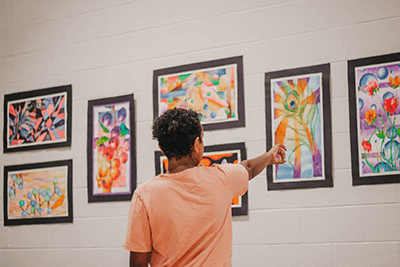October 6, 2022

from Dr. Bill Hudson, head of school
One of my favorite times of the year is early fall, when the first round of student artwork is displayed throughout the school. Bare walls come alive with beauty, creativity, and splashes of color. With just a few weeks of the semester to cultivate ideas and build skills, I am astounded by students’ accomplishments. This year is no exception. A quick walk about the school will be rewarded with marvelous displays of shape, lines, textures, shading, and values.
I am sometimes asked why MPA considers the arts an integral part of our academic program. Shouldn’t a college-prep school focus solely on subjects such as math, science, and English? The arts are considered electives or optional in many schools, but not at MPA. Unfortunately, many schools are forced to cut art education to free up funding and make time for standardized assessments. In contrast, we firmly believe that art education is essential to developing skills, mindsets, and attributes in the whole person both during their time at MPA and throughout their lives.
Many of us are familiar with the term growth mindset. A growth mindset is a belief about the malleability of intelligence and is associated with a wide variety of positive academic outcomes, including curiosity, resilience, and improved achievement. Guided by their teachers, students see that there is more than one way to approach a problem and that every solution, when well executed, offers a unique perspective. As a result, they learn that instead of mistakes being a failure to replicate an ideal, they are opportunities to expand ideas and use the process as an opportunity to creatively problem solve. “I love the process of designing a visual challenge,” says Middle and Upper School art teacher Renee Sonka. “Preparing students to meet that challenge, and then stepping back to see the incredible variety of beautiful solutions that result from that process.”
Related to a growth mindset, but separate from it, is intellectual risk-taking: students, despite the risk of making a mistake or being judged by a peer or teacher, are willing to contribute ideas, questions, or creative thoughts. Intellectual risk-taking is engaging in actions and behaviors regardless of potential errors or judgment. During a recent classroom visit, I listened as art teacher Lisa Buck made this point in a conversation with her seventh-grade students. “Perfect isn’t a word we use around here. Perfection is an illusion, not reality. I’m looking for your personal best.” Intellectual risk-taking improves students’ problem-solving skills, study habits, engagement, motivation, enjoyment of learning, and perseverance through difficulties.
Research demonstrates the many benefits of art in schools. It leads to higher academic achievement, cultivates social and emotional development, and fosters civic engagement. Art education is associated with gains in math, reading, cognitive ability, critical thinking, and verbal skills. It also improves motivation, concentration, confidence, and teamwork. Crucial life-long skills such as creative problem-solving, confidence building, critical thinking, risk-taking, embracing failure as a part of learning, and resiliency are fostered through art education.
Without question, there is more to art than research can demonstrate. The intrinsic value of art benefits the artist and others. Art is an essential means of self-expression, fosters empathy, and reflects the human experience. Art brings beauty and joy to all of our lives and is a pathway toward fully embracing our humanity.
I strongly encourage you to make time to enjoy and appreciate the incredible art created by our students. Amid parent-teacher conferences this week, take a stroll down the Rossbach Art Walk to take in the fifth-grade leaf print compositions, stop by the Family Commons to appreciate the brilliant colors of the Upper School tempera paint designs, or admire the Upper School contour line drawings in the Upper School Commons. I hope it brings you joy and lifts your spirits as it does for me.